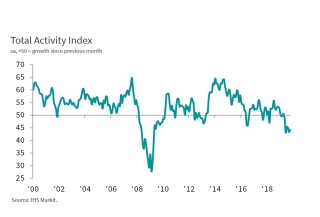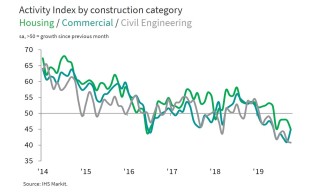The latest survey, conducted among an industry panel by HIS Markit, also revealed a sharp drop in new work.
And there are suggestions that contracts that are being awarded could result in little or no profit for the contractors. As is typical when orders slow, suicide bidding appears to be on the rise.
At 44.2 in October, the headline seasonally adjusted IHS Markit/CIPS UK Construction Total Activity Index again registered below the crucial 50.0 no-change threshold. The latest reading was up slightly from September’s 43.3 score but still close to the 10-year low seen in June (43.1).
Construction companies reported that client demand remains subdued amid domestic political and economic uncertainty. Some respondents cited unusually wet weather in October as an additional headwind to construction output.
Lower volumes of work were recorded across all three broad categories of activity. Civil engineering was the worst-performing area, with business activity falling at its sharpest pace since October 2009. House-building activity also decreased, and more quickly than in the previous month – latest data pointed to the greatest drop in residential work for over three years. Commercial construction fell for the 10th month running, although at the slowest rate since May.
New orders dropped for the seventh month in a row during October, but the rate of decline was the least marked since July. Construction companies noted that clients continued to defer decision-making on new projects in response to political uncertainty and concerns about the economic outlook. Survey respondents also suggested that intense competition for new work had resulted in more widespread price discounting to secure contract awards.
Softer demand conditions and a lack of new work to replace completed projects resulted in another fall in staffing levels across the construction sector. Employment numbers have declined in each month since April. Fortunately this has been largely achieved without redundancies. Instead, voluntary leavers are not being replaced.
Tim Moore, economics associate director at IHS Markit, which compiles the survey, said: “UK construction companies experienced a downturn in business performance during October as political uncertainty and subdued economic conditions again combined to hold back sales. New orders have fallen in each month since April, which is the most prolonged period of decline recorded for more than six years.
"Civil engineering was the worst-performing area of activity in October, with business activity dropping at the fastest pace in ten years. Construction companies also voiced concerns about the uncertain outlook for large-scale infrastructure projects upon which growth is expected to rest in the coming years.

"House building has also lost momentum this autumn amid a broader slowdown in market conditions, with the latest survey data signalling the sharpest drop in residential work since June 2016.
"There are clear signs that construction firms are positioning for an extended soft patch for project starts, as highlighted by a further decline in purchasing volumes and another month of cuts to workforce numbers through the non-replacement of voluntary leavers."
Duncan Brock, group director at the Chartered Institute of Procurement & Supply, which sponsors the survey, said: "The construction sector’s distressing decline continued in October in spite of a small improvement in the headline index as a resolution to the political impasse seemed close. However with a fall in civil engineering not seen for a decade and the biggest drop in housebuilding since 2016, it appears that strength in the sector is seeping away.
"Jobs hiring suffered as businesses unsure of the government’s next steps held back on their development plans, which were weakened further by stronger competition for fewer opportunities. Future optimism remained at 2012 levels as the deep-seated Brexit gloom dampened down expectations.
"To say these figures are disappointing is a big understatement. Given that the next political hurdle is December’s general election, all eyes will be on the new administration and clear direction, because at the moment there is little insight into what could possibly pull the sector out of its ditch."
Jan Crosby, UK head of infrastructure, building and construction at KPMG, said: “While the sector has contracted at the slowest rate in three months, it’s widely anticipated that the remainder of the year is likely to be as lacklustre as recent months - characterised by stalled activity, dampened confidence and a ‘wait-and-see’ approach to new work.
“There had been pockets of optimism in the run up to 31st October, largely because people were looking forward to some form of clarity around the future of the sector, but Brexit uncertainty has returned once more, coupled with a general election to boot.
“There is widespread evidence of a sluggish housing market, which is likely causing some housebuilders to slow build rates on sites – particularly those not benefiting from Help to Buy. Meanwhile, the commercial sector also appears to be struggling, with investment in the likes of grade-A office space drying up amid the uncertainty. Many clients are likely to hold off until next year before committing to any large-scale projects in the hope they can make more informed decisions. For now, it’s a case of sitting tight.”
Gareth Belsham, director of surveyors Naismiths, said: “Contractors are being pummelled on three fronts. Just as their order books get thinner and erode their confidence, they are being forced to bid low for the shallow pool of new work available – while at the same time input costs go up and slice into their margins.”
Got a story? Email news@theconstructionindex.co.uk




